Are you a hummus lover? Here is your guide on how long hummus lasts, how to identify when it goes bad, how to store it properly and tips on prolonging shelf life so you can enjoy it longer!
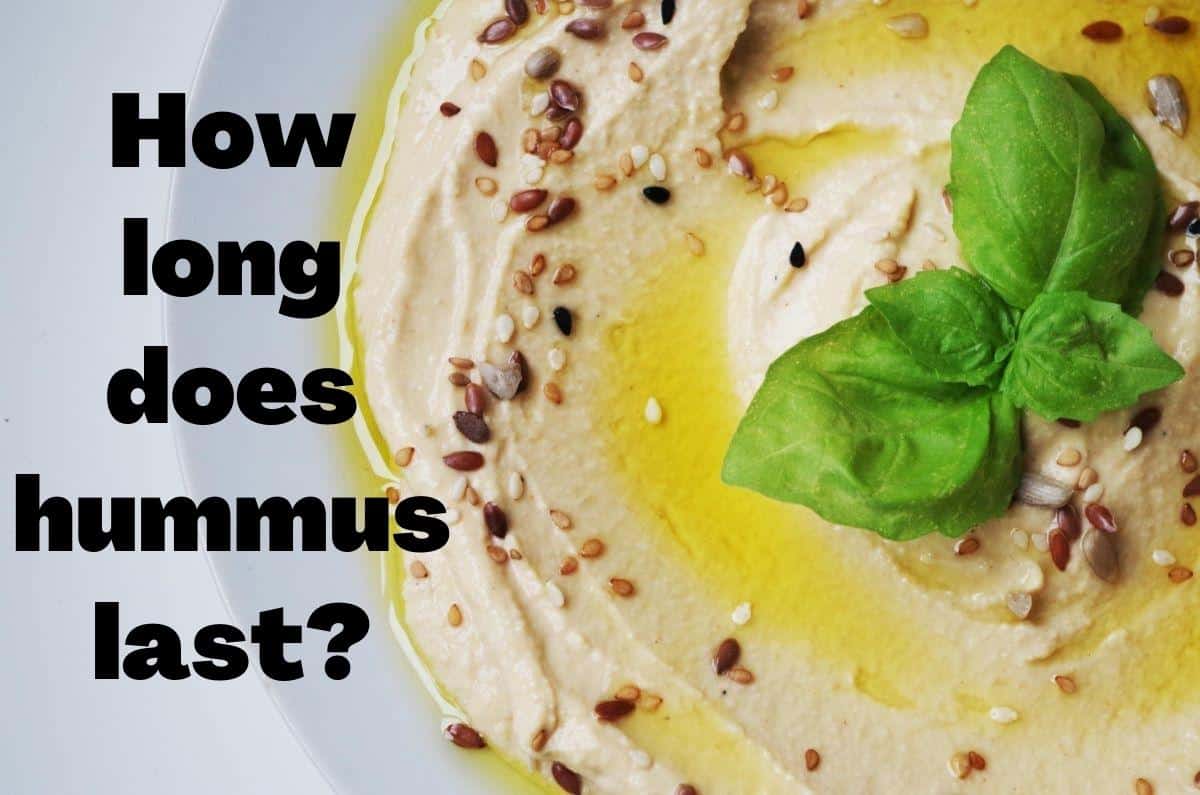
Imagine opening your fridge and finding a container of hummus only to wonder how long it's been sitting in there and if it is still good to eat? Maybe you thought about that one time at a party when you had a hummus dip so tasty that you couldn't stop eating it, but you left it out for a bit too long. Well, you're not alone!
Hummus is a delicious snack, but knowing how long it lasts and how to store it properly is important to avoid any tummy troubles. In this informative guide, we'll dive into everything you need to know about shelf life, storage tips, and even some creative uses for leftovers.
Jump to:
Is hummus a healthy snack?
Hummus is one of those foods that people hungrily (and guiltily) devour without realizing how healthy it is. Maybe it’s the rich, creamy texture that fools us.
This famous Middle Eastern spread is a smooth, zesty combination of mashed chickpeas, garlic, tahini (a paste made from sesame seeds), olive oil, lemon juice, and spices.
Hummus boasts a heavenly taste but it also has incredible health benefits:
- Just one serving of your favorite dip (2 tablespoons) contains more than 2 grams of protein and almost 2 grams of fiber.
- It is very low in sugar and cholesterol.
- It contains plenty of heart-healthy, unsaturated fats.
- It also provides key nutrients like vitamin C, calcium, iron, and potassium.
Nutritional Profile
| Nutrition | Amount per Serving (2 tbsp) |
|---|---|
| Calories | 70-80 kcal |
| Protein | 2-3 grams |
| Total Fat | 4-5 grams |
| Carbohydrates | 6-8 grams |
| Cholesterol | 0 mg |
| Sodium | 60-80 mg |
| Calcium | 20-30 mg |
| Iron | 0.5-1 mg |
| Potassium | 60-70 mg |
It is an excellent source of protein if you are vegan, vegetarian, or looking for ways to introduce more plant-based foods to your diet. It is also a powerful food for weight loss or to lower cholesterol naturally.
Does hummus need to be refrigerated?
Store-bought: Once you bring it home from the store, you will need to store it in the fridge. It should remain refrigerated at all times, ideally at or less than 40℉.
Homemade: Once you've made that delicious hummus, store it in the refrigerator within 2-3 hours of making it.
Try storing it in the back or coldest part of your fridge, away from the door (the constant opening and closing will cause the temperature to fluctuate).
How Long Does Hummus Last?
Here is your guide on how long hummus lasts whether it is store bought or homemade:
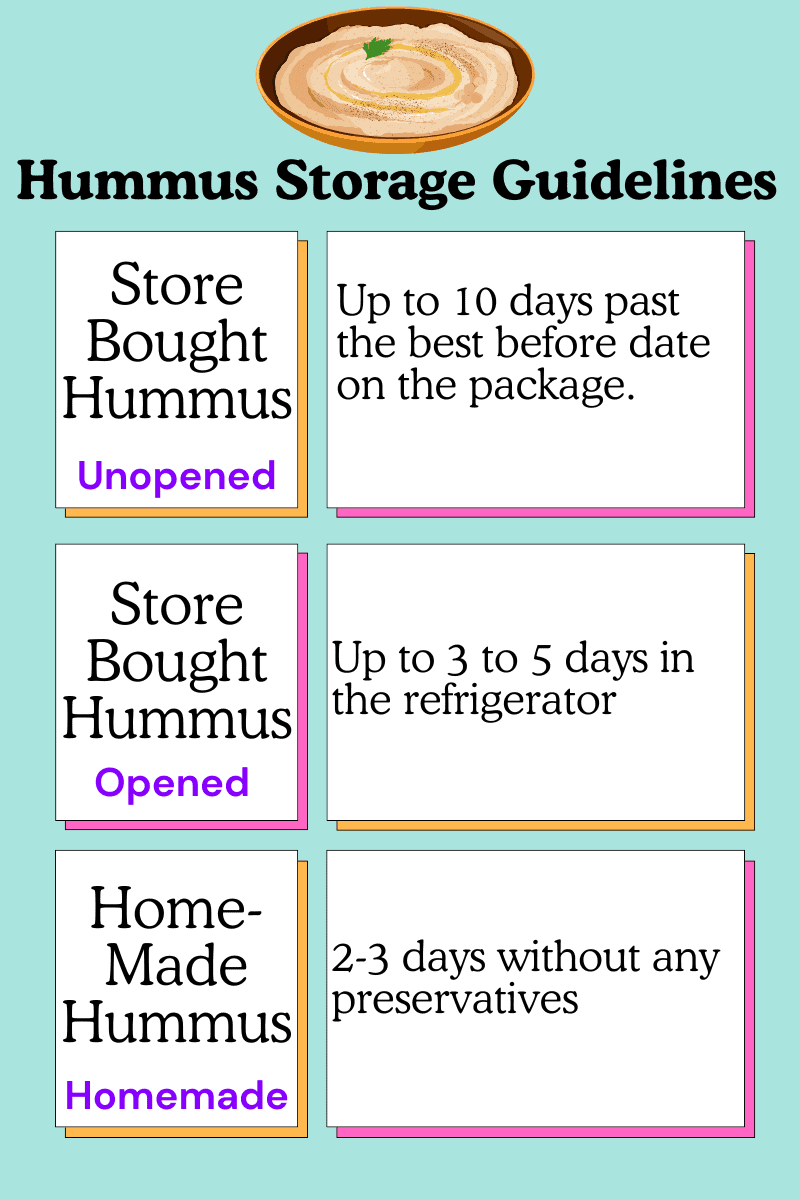
How long do different varieties of hummus last?
Different types of hummus also have varying shelf lives:
- Plain: Generally lasts longer than flavored varieties.
- Flavored: Ingredients like roasted red peppers or sun-dried tomatoes can shorten its shelf life by 2-3 days.
- Homemade: Lacks preservatives, so it has a shorter shelf life compared to store-bought versions.
Regardless of which type you store, always use clean utensils to dip into the hummus to avoid contamination from other foods…or from that spoon that you’ve already licked!
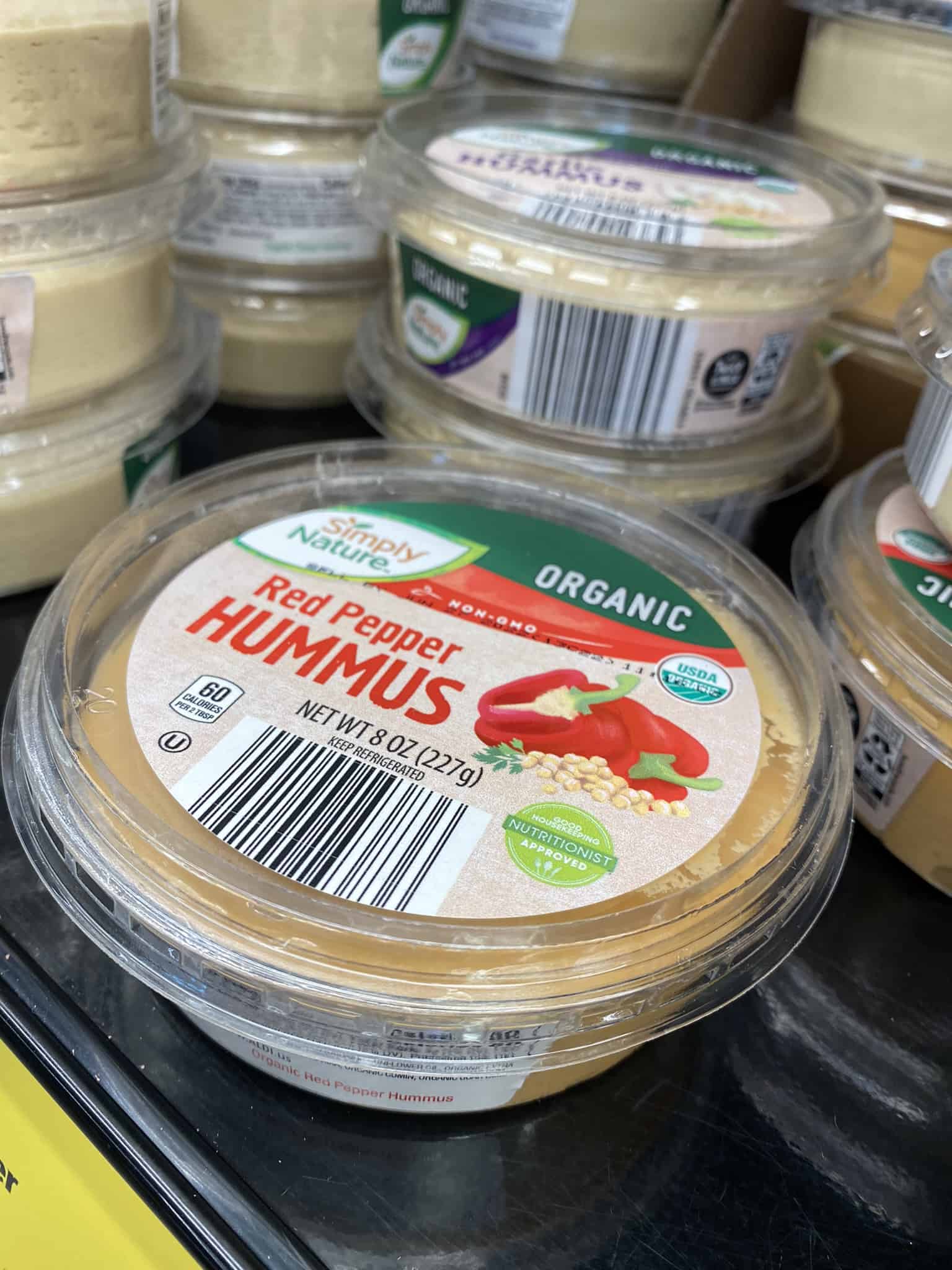
Preservation Methods
The biggest difference is how commercial types are preserved. For a long shelf life, companies use one of these methods:
- Pasteurization - a heat treatment to limit bacterial growth
- Added preservatives like potassium sorbate, sodium benzoate, or citric acid
- High Pressure Processing (HPP) - a cold treatment that some have found to be more effective
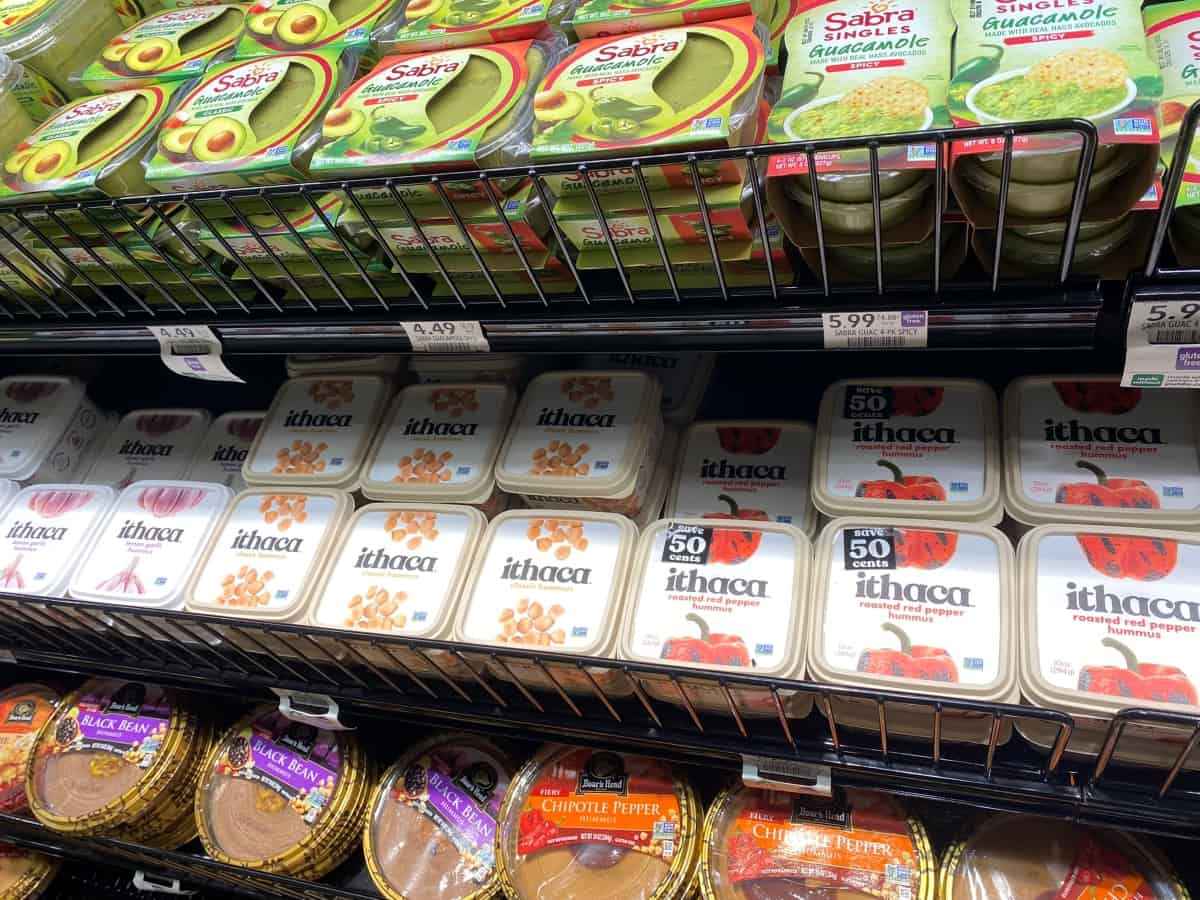
Homemade varieties, of course don't have any built in preservatives, however you can prolong the shelf life of hummus by squeezing a bit of lemon juice.
Lemon juice lowers the pH of the food, and acts as a natural preservative.
Whatever you decide, don’t displease the hummus gods by eating cold hummus! Let that refrigerated hummus come to room temperature or use one of these easy reheating tips.
Proper Storage Tips
If you’re making your own hummus, you can store it in any airtight container. Most people find plastic convenient but glass tends to be more eco-friendly.
For store-bought varieties, you can extend the life of the hummus by sealing the top of the container with plastic wrap before you cover it with the lid.
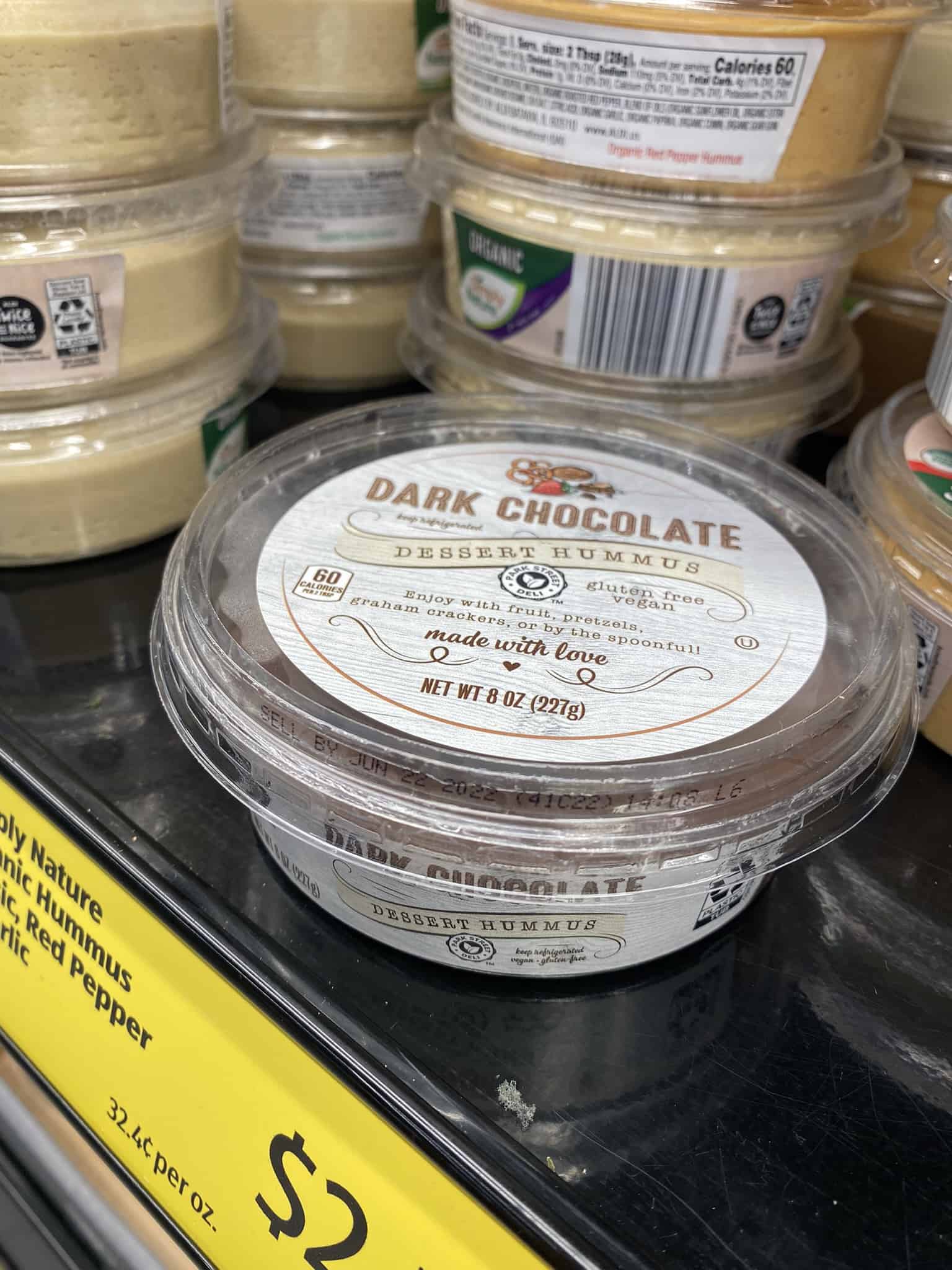
Room Temperature Guidelines
Hummus was made for bringing family and friends together. But how long can it hang out with the crowd?
To prevent bacterial growth, the USDA strongly discourages leaving refrigerated food out for longer than 2 hours (and 1 hour on a hot day).
Perhaps you can serve it when the guests are ready to indulge or keep it on ice for a short while.
Also, to prevent cross-contamination, don’t allow guests to dip directly into it; provide a serving spoon and small plates instead. Or even better, take a look at this adorable cucumber hummus cup appetizer.
Here are two more awesome party pleasers: a hummus party board and a layered hummus dip.
Can you put hummus back in the fridge after it has been sitting out?
Food hygiene plays a huge role in how long hummus will last.
For snacking at home, you can safely transfer some to your plate (with a clean utensil) and return the original container of hummus to the fridge.
But for entertaining, take out only the amount you plan to serve because whatever is left out for more than 2 hours should NOT be refrigerated. Leftover hummus could be contaminated.
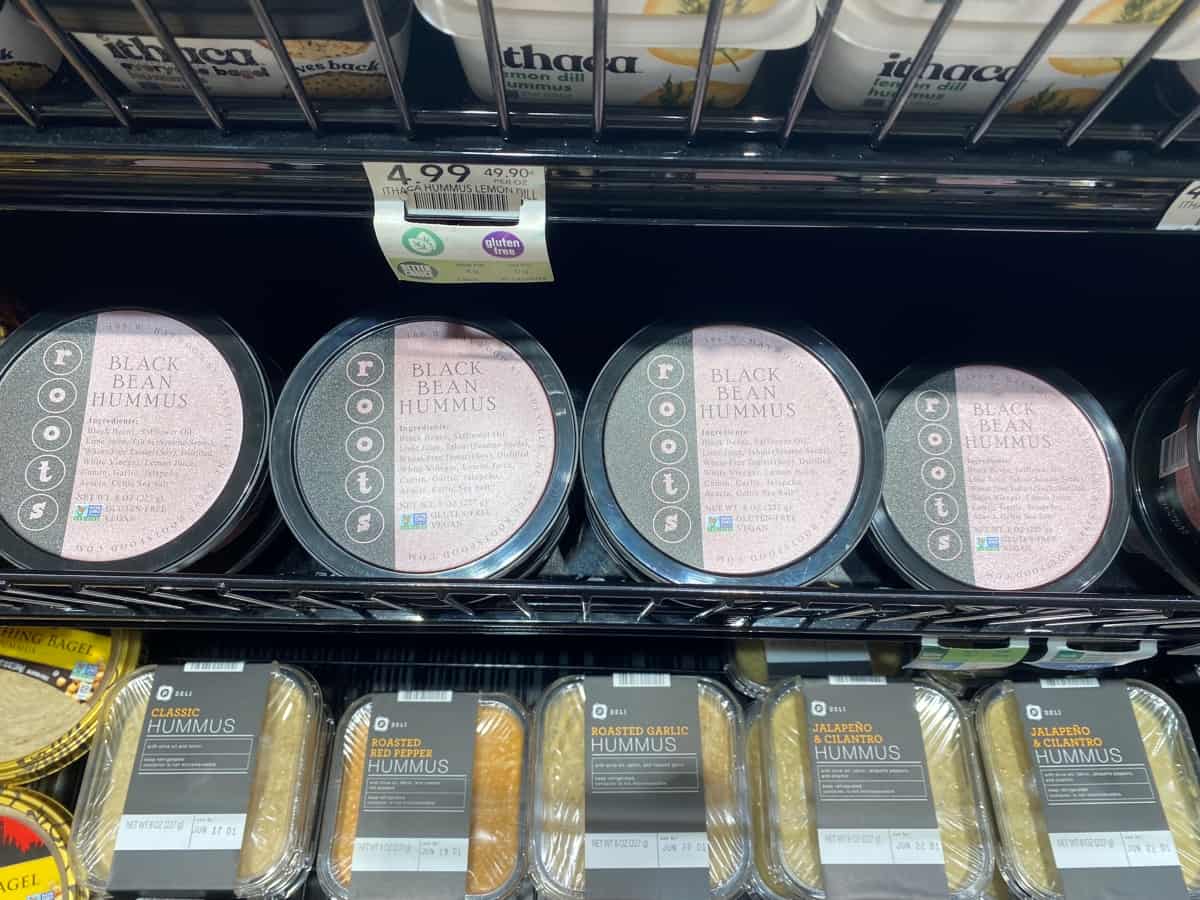
What about shelf-stable hummus?
Shelf-stable versions are sold for storage at room temperature but you still need to refrigerate them once you open the container.
Here are some promising unrefrigerated hummus brands: Brami and Hummustir.
Store the sealed container in a cool, dry place if unopened. Once opened, store in fridge for 5-7 days just like any other store bought hummus.
Can I freeze hummus?
Yes, you can! Most experts suggest up to 3-4 months in the freezer for both store-bought and homemade hummus. Freezing for longer periods would give you a more bland version of the original.
How to properly freeze:
- Choose the right storage container: Use airtight glass or plastic bowls, jars, or ice cube trays and muffin tins for small batches. Here’s an even easier way to make tiny portions: scoop hummus onto a tray lined with wax or freezer paper; when frozen, transfer to heavy-duty freezer bags and pull one out whenever you need!
- Leave space on top of the container: No matter what container you use, hummus will expand in the freezer. If you are using the original store-bought packaging, remove the plastic seal around the lid to give the it more room to expand.
- Add a thin layer of olive oil on top: This will seal the hummus and keep it from drying out. It may also help to keep the smooth consistency of the hummus. When you thaw, simply give it a good stir.
How to defrost frozen hummus:
To get the best quality of hummus, leave the frozen container in the fridge for 24 hours prior to using it. Do not refreeze it once it is refrigerated. You can store in fridge for 3-4 days.
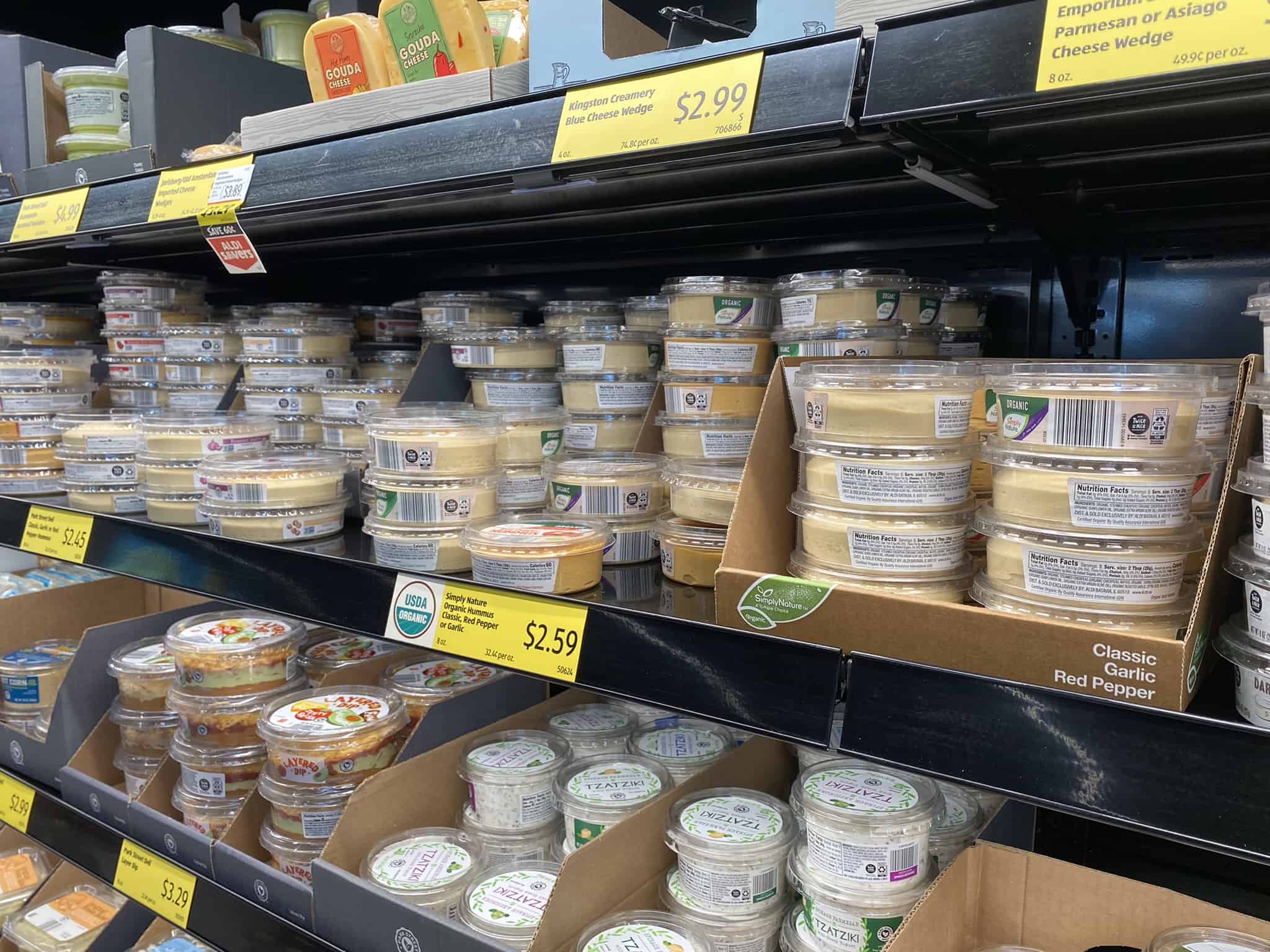
How to tell if hummus has gone bad
What do you do when you see a strange mold growing on the hummus? Do you scoop it out carefully? Then, you start typing online to find out if it’s safe to eat moldy hummus?
Let me save you from some graphic internet photos of bad hummus.
Toss it out. All of it.
Any hummus will spoil in the fridge if old or neglected. The container of hummus is opened, air gets in, along with bacteria, and mold starts to grow.
But hummus could go bad even before there are visible signs, such as a change in color (it gets darker) and texture (hardens). If you notice a sour smell or taste from the hummus, it’s time to part ways with the entire container of bad hummus.
Homemade recipes
If you have a food processor, hummus is one of the easiest foods to make! The base is usually chickpeas (garbanzo beans) but many varieties use other beans instead.
Here are just a few varieties that are chart toppers:
- Roasted Garlic Parmesan hummus
- Buffalo Blue Cheese hummus
- Avocado hummus
- Basic Hummus without Tahini
- Cannellini Bean Hummus
- Green Olive Hummus (Tahini Free)
- Hummus pasta salad
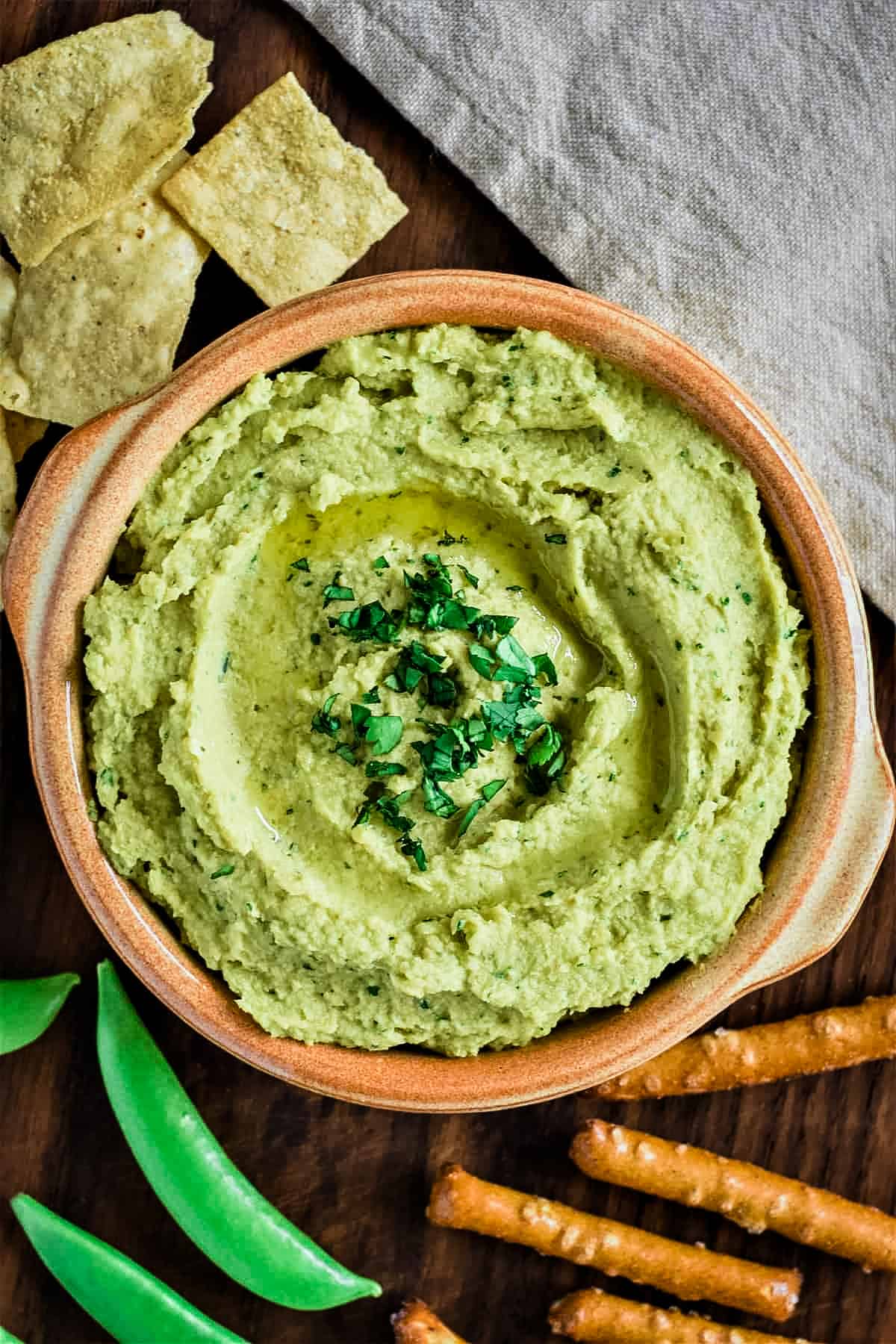
Here are some that I’m anxious to try myself:
- Classic hummus with tahini
- Instant Pot hummus
- Black Eyed Peas hummus
- Green Goddess hummus
- Caramelized Onion hummus
What do you do with all this hummus, now that you know how to store it properly?
Did you find the article informative? Leave us a comment below!
More "How long does it last?" resources
- Does coconut oil go bad?
- Does nutritional yeast go bad?
- How long does quinoa last in the fridge?
- Does tofu go bad?
©Watch Learn Eat. All content and images are copyright protected, and are not to be used or republished without prior permission. You may; however, link back to this post on your website as a reference tool. Some images shown in this post are used with permission as part of Creative Commons CCO through Pixabay.com.

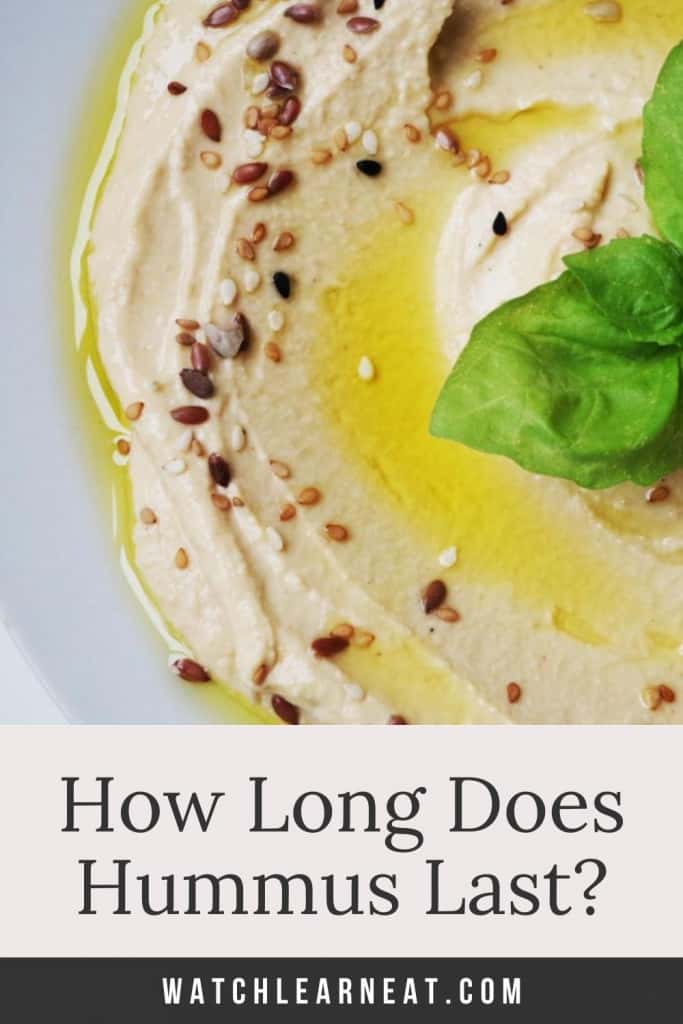




Leave a Reply